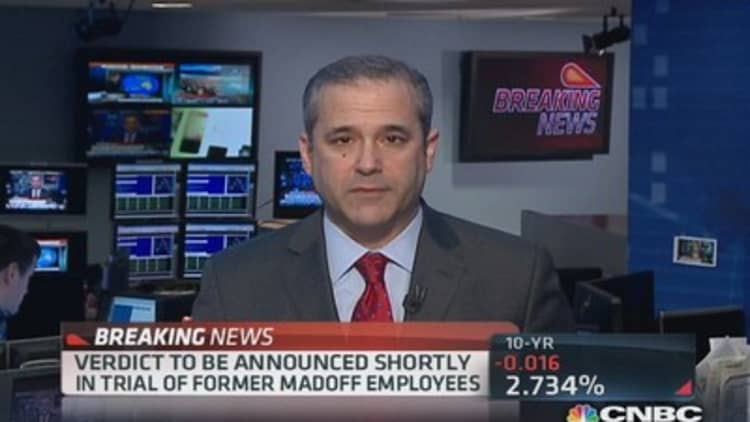Victims of the epic Madoff Ponzi scheme could get back another $349 million under a proposal submitted to the bankruptcy court Tuesday by trustee Irving H. Picard. The proposed distribution, the fourth since the scandal broke, brings the total payout to nearly $6 billion.
More importantly, Picard said if the payment is approved, more than half of Madoff's direct victims—everyone with claims of $925,000 or less—will have recovered their entire principal. It is a recovery Picard could hardly have imagined when he was appointed to recover assets a week after the scheme collapsed in 2008.
"I certainly would have hoped for it," said Picard in an interview with CNBC. "It was a goal."
Picard estimates Madoff clients lost $17.5 billion in the scam, based on the amounts they invested minus their withdrawals. But because their statements also showed fictitious "returns" on their investments, the victims' losses on paper were more than $65 billion, most of which they have no hope of getting back.
In all, Picard said his team has recovered nearly $9.8 billion, or around 56 cents on the dollar of actual losses. In addition, the Securities Investor Protection Corp. (SIPC), which insures U.S. brokerage accounts, has paid nearly $812 million.
"We look forward to continuing to work with the Trustee to make funds available to victims as soon as possible," said SIPC President Stephen P. Harbeck in a statement. "We hope that trend continues, and even accelerates, as the remaining legal disputes are resolved."
A separate fund made up of criminal forfeitures, and administered by the Justice Department, has amassed another $4 billion, to be paid primarily to people who invested with Madoff indirectly through feeder funds.
Picard said he is unable to pay out all the money he has recovered because some victims have sued over his formulas for calculating their losses. As a result, Picard said he is forced to hold nearly $3 billion of the recovered money in reserve in case the challenges are successful. Were he able to release those funds, he said it could free up as much as 10 more cents on the dollar for victims.
"For some people, this could give them a sizeable additional amount," he said.
Among the biggest disputes, Picard said, is a suit by some investors seeking "time-based damages"—allowing them to recover interest on their funds on top of their principal. A federal court ruled against the investors, but an appeal is pending. For that case alone, Picard is holding $1.37 billion in reserve, and the number will increase by another $70 million if the latest payout is approved. "Every time we make a distribution we have to add to that reserve," Picard said.

Still, the recoveries thus far are unusual for any Ponzi scheme, let alone one of this magnitude.
Picard said the latest payout, if approved, would bring the number of fully paid claims to 1,129 accounts out of 2,189 that are eligible. And among the claims that have not been fully paid, none has received less than about 46 cents on the dollar.
The latest distribution is due in large part to a $2.6 billion civil and criminal settlement announced in January between U.S. authorities and JPMorgan Chase, which was Madoff's primary banker. The figure included a $325 million settlement with Picard, which comprise the bulk of the money he hopes to return to investors by May.
But Picard has more targets on his radar screen. In October, he appealed to the Supreme Court to allow him to sue UBS, HSBC and UniCredit Bank Austria, which he claims aided the fraud. The banks have denied wrongdoing, and the high court has not yet decided if it will hear the case.
He also has claims pending—albeit much smaller ones—against former Madoff Director of Operations Daniel Bonventre and former account supervisors Annette Bongiorno and Jo Ann Crupi, three of the five employees convicted Monday of helping to cover up the fraud. Two computer programmers, Jerome O'Hara and George Perez, were also found guilty.
Picard would not speculate on how the verdicts might affect his lawsuits against the employees. But his counsel, Oren Warshavsky, said "it confirms what we were saying" about the duration of the fraud, which testimony showed dated back to the 1970s, and the fact that Bernard Madoff could not have acted alone.




